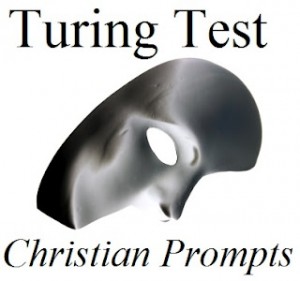This is the fifth entry in the Christian round of the 2012 Ideological Turing Test for Religion. In this round, the honest answers of Christians are mixed in with atheists’ best efforts to talk like Christians. It’s your job to see if you can spot the difference. The voting link appears at the end of the entry, and you can look at all entries in this round here.
When (if ever) have you deferred to your philosophical or theological system over your intuitions?
As a Catholic I believe in truth. I think there is one truth, that truths don’t contradict each other, and that truth flows directly from being, i.e., from reality. Now, as a human being, I’m naturally limited in knowledge to what I can learn from sense experience, and it’s possible to make mistakes when judging based on sense experience. Moreover, what one apprehends to be the case may not actually be so. However, since in matters that admit confusion or error we make recourse to more fundamental principles to clarify and correct less certain conjectures, and since the origin of faith is God, who is also the originator of all being and the supreme knower of creation, if faith contradicts an intuition, then I should prefer faith (as a higher and more perfect principle of truth) and try to see where my intuition goes astray. Faith doesn’t contradict rational truths but sometimes leads us to them when they’re difficult to find otherwise. So, yes, there have been occasions, (e.g., predestination) but these are always chances for deeper investigation and clarification — not for blind submission and the repression of contrary impulses. And I investigate with the assurance (so far never proven wrong) that things will resolve themselves in a non-contradictory way.
Are there people whose opinions on morality you trust more than your own? How do you recognize them? How is trusting them different than trusting someone’s opinion on physics?
There are people whose opinions I trust on morality more than my own. I trust them based on demonstrated personal sanctity and sometimes the authority of a person’s teaching office. So, for example, an older priest I know is trustworthy because I know him to be a good and humble man who has spent much of his life developing an understanding of the human person in relationship with God and the various ways that virtues, passions, vices, etc. contribute to the perfection of that relationship. A moral authority is different from a physicist in the nature/acquisition of their knowledge and the way in which it’s recognized. The physicist’s knowledge is based on experimental data that I will never be able to replicate, and yields mathematical models that are wildly counterintuitive and sometimes incomprehensible. The moral authority’s knowledge is based on clarity of thought and a recognition of the good, which can be verified with considerably less difficulty, if not through immediate reflection, then through moral development and experience.
Can you name any works of art (interpreted pretty broadly: books, music, plays, poetry, mathematical proofs, etc) which really capture the way you see life/fill you with a sense of awe and wonder? You can give a short explanation or just list a few pieces.
Beethoven’s 7th Symphony, especially the first two movements. Mahler’s symphonies (esp. 5,8,9). Psalms 69, 144, 97. The Magnificat. Sonnet 29. Bernard of Clairvaux on the degrees of pride.
Click here to judge this entry, and, once you’ve voted, feel free to speculate and trade theories in the comments or look at other entries in this round.
















